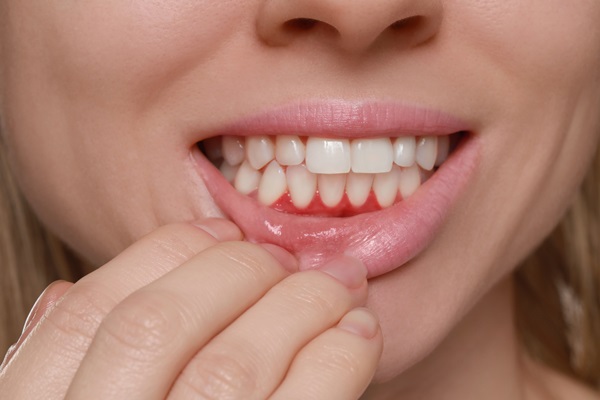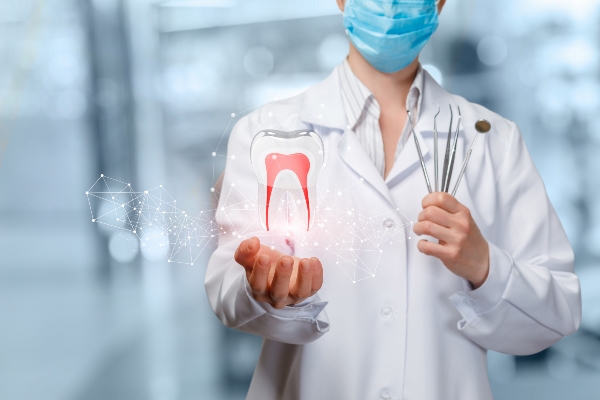Common Signs of Gum Disease

Gum disease is also known as periodontal disease. This is a condition that causes inflammation of the tissue around the patient’s teeth. It is caused by bacteria building up in the area. Keep reading to learn about some of the symptoms of gum disease.
About gum disease
Periodontal disease is a progressive condition, meaning it gets worse over time. In the end, it can cause the teeth to be lost. It starts out as gingivitis, a bacterial infection. That causes the gums to become inflamed.
The toxins released by the plaque can destroy the jawbones and the gums. This will negatively affect how a person speaks, looks, and chews. No matter what stage a patient is in, immediate treatment is required. There are several signs of each of the stages.
Swelling, redness, or pain
The gums may look inflamed or feel painful. The infection can quickly spread, and stopping it is critical. Without treatment, it can enter the bloodstream. Then it will affect other body parts.
Bleeding is another sign that patients might notice. Brushing or flossing can irritate the inflamed gums. However, even just eating can cause issues. Patients who are going through menopause or pregnancy can also have bleeding gums.
Bad breath
There are many causes of bad breath besides gum disease. For example, some foods may be very pungent. The smell can come from the lungs, back of the tongue, or stomach. Tobacco use or smoking can also cause bad breath.
Sometimes, food particles are caught between the patient’s teeth and move under the gumline. However, patients who have gum disease are more likely to suffer from bad breath. With the pockets formed by the disease, food particles can become trapped there. This can be a red flag.
Receding gums and pus pockets
Gum disease can cause the tissue to move away from the teeth. It happens when the bacteria have damaged the tissue. This makes the teeth look longer. Then the smile will appear to be “toothy.” With treatment, the patient may receive gum grafts to restore the smile.
In more advanced stages, pus may appear between the teeth. The body makes this when it needs to fight off an infection. Antibiotics may be used before and during treatment. This can kill off harmful bacteria.
Loose teeth
In the more advanced stages, the teeth will start to become looser. The teeth will then shift around in the mouth. This happens when the bone tissue is destroyed. It can then no longer properly support the teeth. At this stage, the patient will most likely need to undergo several advanced treatments. The goal will be to save the remaining teeth.
Benefits of gum disease treatment
Gum disease is a silent destroyer. People often find out about the condition when it is in its late stages. Once the dentist detects it, the patient can get the treatment right away. Here are the benefits of this treatment:
- It restores oral health. The main goal of gum disease treatment is to bring back one’s dental health. Removing tartar and plaque from the mouth can bring back one’s pink gum tissue. This treatment ends gum bleeding, swelling, and tenderness. It can help the patient regain comfortable dental functions. This may even lead to the growth of healthy gum tissue and prevent gum recession.
- It prevents complications. Allowing bacteria to increase in number can lead to tooth decay. Gum disease treatment can prevent more complicated oral problems. It protects the mouth from more damage from periodontal disease.
- It lowers discomfort and pain levels. Gum infection can cause severe pain. The swelling often comes with discomfort. The right treatment can help the bleeding and inflammation go down.
- It freshens breath. Bad breath is a common symptom of periodontitis. It comes from the combination of plaque, decaying particles, and other microbes. The right treatment can remove this problem and bring back one’s self-esteem.
- It restores one’s beautiful smile. Gums help an individual maintain teeth. Healthy gums frame the teeth. Gum disease results in bleeding and swelling. This makes one self-conscious about smiling, laughing, speaking, or eating in public. The treatments can help bring back the beauty in one’s smile.
- It maintains good general health. Studies show that gum disease affects one’s general health. Diabetes and heart disease are said to have a connection with gum disease. Concentrating on gum health can lower a person’s risk of these health conditions.
Visit a dentist for gum disease treatment
If you are experiencing any of the symptoms above, you should seek treatment immediately. Your overall health can be negatively affected by this condition. The earlier that you catch gum disease, the more reversible it is. The right home care can go a long way toward treating it.
Request an appointment here: https://serenitydentalspa.com or call Serenity Dental Spa at (415) 376-6196 for an appointment in our San Francisco office.
Check out what others are saying about our dental services on Yelp: Gum Disease in San Francisco, CA.
Related Posts
Gum disease is a serious condition that can result in a need for periodontal treatment. Periodontal treatment is often necessary to destroy the infection and prevent it from worsening. Often, without treatment, a case of gum disease can become advanced, resulting in tooth loss, receding gums, and even jaw deterioration, all of which can be…
Healthy oral habits can prevent issues that may lead to infections such as gum disease. This problem, also known as gingivitis, can be common in both children and adults; however, if it is left untreated, it may worsen and cause serious discomfort or cause secondary infections within the body. Oral treatments such as scaling and…
When it comes to oral health, the condition of the gums can be key. Proper brushing, flossing and the prevention of gingivitis can support good gum health; however, when individuals suffer from crooked teeth, an underbite or an overbite and choose to get braces, this may cause problems with the gingiva. Dental patients who want…
Laser dentistry has revolutionized modern dental care, offering patients a more comfortable and efficient experience than traditional methods. Laser dentistry uses focused light energy, allowing dentists to perform various procedures with increased precision, reduced discomfort, and faster healing times. As this technology advances, it becomes an increasingly popular choice for routine treatments and more complex…


